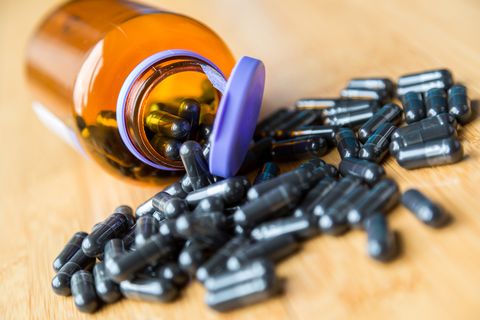
.................................................................................................................................................................
Activated
Charcoal And Hangover
Can Taking Activated Charcoal Help Your Hangover?
Some claim this trendy
black powder works detox wonders, but what do the experts say?
By MARYGRACE
TAYLOR
The only thing worse than waking up with a
hangover is waking up with a hangover and trying to go for a run.
So, if you plan to have a drink (or three)
tonight and have a workout planned for the morning, could taking activated
charcoal help you feel less awful?
Activated charcoal — the trendy black powder
that wellness enthusiasts claim can help you detox — is charcoal made from
materials such as coconut husks, peat, or bone char.
It’s processed at super-hot temperatures
(much higher than the temps used to make the charcoal for your grill), which
makes it highly porous.
And indeed, the stuff
has long been used in emergency rooms as a treatment for poisoning. “Activated
charcoal works by binding to drugs and toxic substances located in the
gastrointestinal tract, thereby preventing their entry across the
gastrointestinal tract into the bloodstream,” explains Glenn Hardesty,
D.O., an emergency room physician at Texas Health Presbyterian Hospital Plano.
The toxin-filled charcoal makes its way
through your GI tract, and a day or two later — presto! — you poop the gunk
right out.
So, could popping a few activated charcoal
pills also help nix the unpleasant effects of alcohol, and maybe even help you
avoid a hangover altogether? Here’s what the experts say.
Can activated charcoal help a hangover?
Alcohol is a toxin, and activated charcoal
absorbs toxins in the body.
So, it might seem like taking the stuff could
help sop up any excess booze that’s circulating in your system and help you
avoid the morning-after head throbbing, fatigue, and stomach ache. Except, it
doesn’t.
Experts have actually studied this, to see
whether activated charcoal could be used to treat alcohol overdoses in the E.R.
One study found that subjects who took
activated charcoal just 30 minutes after drinking had the same amount of
alcohol in their bloodstream compared to drinkers who didn’t take the charcoal.
That’s because activated charcoal absorbs
toxins that are still in the stomach, not ones that have already made their way
into the blood, Hardesty explains.
And anyway, “a
hangover happens many hours after you’ve been drinking. So even if activated
charcoal did prevent alcohol absorption, it wouldn’t help with a hangover
because a hangover comes on after the alcohol has been absorbed [by your
body],” explains Scott Swartzwelder, Ph.D., who studies alcohol’s effects
on the brain at Duke University.
Alright, so forget about taking charcoal the
next morning.
What if you took it before you drink instead?
Sorry, but research shows that that won’t work either.
“Activated charcoal
does not bind to all drugs, toxins, or chemicals,” Hardesty says. And
alcohol, unfortunately, is one of the substances on the no-bind list.
OK, but can I maybe try it anyway?
Maybe your friend swore that activated
charcoal helped them get through a run after a rough night.
That doesn’t mean that the charcoal actually
works (hello, placebo effect!), and it definitely doesn’t mean you should
follow suit.
For starters, it could make you more prone to
runner’s trots. A hangover already predisposes you to nausea, vomiting, and
diarrhea.
“Add the stress of
charcoal being processed through the GI tract, and I’d expect those symptoms to
increase,”
says sports nutrition expert Kelly Jones, M.S., a registered dietitian and
licensed nutritionist.
How to Settle an Upset Stomach During a Race
Another thing: Even though activated charcoal
won’t absorb alcohol, it might sop up stuff in your stomach that you don’t want
to get rid of.
“It can block mineral absorption from the
digestive tract to the bloodstream,” Jones says.
In particular? Iron, which many runners — especially
women — have a hard time getting enough of in the first place.
There’s also the potential for serious health
risks.
Since the combo of alcohol and activated
charcoal could make you more likely to puke, it’s possible to experience a
pulmonary aspiration — where some vomit ends up in your lungs instead of in
your mouth or throat, which is rare but as bad as it sounds.
“It can cause injury
to the lungs, impair the transfer of oxygen, and ultimately lead to aspiration
pneumonia,”
Hardesty says.
The Bottom Line:
Taking activated charcoal to ease your
hangover symptoms won’t work, and it could actually make you feel even
crappier.
In short, “it’s
one of the worst things you can do,” Hardesty says.
If running with a hangover sounds like something
you’d rather avoid, you’re better off drinking a lot of water and pushing your
workout to later in the day, when your symptoms are likely to be less intense.
“With hangovers, the
only really good treatments are fluid and time,” says Swartzwelder.
It might be smarter to just grab your
favorite electrolyte drink and go to sleep.
Another option? Just skip the run altogether
and take a day off to recoup, suggests Jones.
And next time,
consider capping your drinks a little sooner. “The easier thing would be to
just not drink as much,” Swartzwelder says.
Marygrace
Taylor
is a health and wellness writer for Prevention, Parade, Women’s Health,
Redbook, and others.


No comments:
Post a Comment